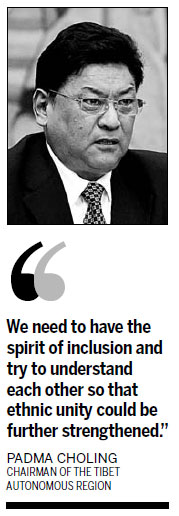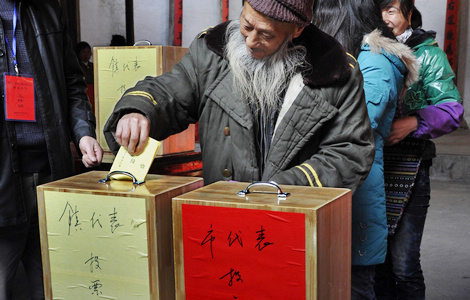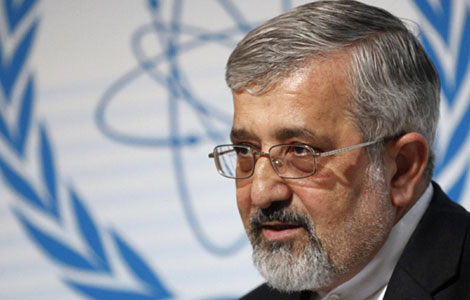 |
|
|
|
|||||||||
Padma calls for improved basic infrastructure and living standards
The social situation in the Tibet autonomous region is stable and border defenses have been strengthened, a senior official of the region said on Thursday.
"I can tell you with full responsibility that currently the region is stable and safe. If not, how it could be possible for me to take a week-long vacation during the Tibetan New Year holiday last month and come to the annual National People's Congress session in Beijing to perform my duty as a deputy with no worries?" said Padma Choling, an NPC deputy and chairman of the region.
|
 |
Tibetans have just celebrated a happy and peaceful Tibetan New Year, which started on Feb 22 this year and lasted 15 days, he said during an exclusive interview.
The clique of the Dalai Lama is trying in vain to continuously create incidents in Tibet and the Tibetan-inhabited areas in the provinces of Sichuan, Yunnan, Gansu and Qinghai, said Jia Qinglin, chairman of the Chinese People's Political Consultative Conference.
In late January, rioting and attacks against police and public property in Luhuo and Sertar counties in Southwest China's Sichuan province left two rioters dead and 24 police officers and firemen injured.
Evidence showed that the riots and assaults were planned beforehand and instigated by trained separatists, according to the Sichuan government's information office.
"The region's stability depends on how much work we put into maintaining social order as well as other efforts, including continuously improving Tibetans' living standards," he said. "I am confident in maintaining Tibet's overall stability."
He said to prevent the recurrence of a riot like the one on March 14, 2008, in Lhasa, capital of the region, which left 18 dead, he had been given a lot of ideas and learned from what happened.
"The implementation of preferential policies given by the central government in some fields needs to be further strengthened and have a real reflection on people's lives so they can feel it," he said. "The key to the region's stability is to improve the construction of basic infrastructure at the grassroots level, especially in border areas, and, of course, people's living standards."
People will only appreciate the government's efforts after they actually feel that their lives have been improved, he added.
"We need to have the spirit of inclusion and try to understand each other so that ethnic unity, which is the lifeline of the region's peaceful development, could be further strengthened," he said.
He also said that Tibet has always attached great importance to environmental protection.
"Although Tibet is a resource-rich region, we won't allow any kind of exploitation if it harms the environment and doesn't benefit the locals."
You may contact the writer at cuijia@chinadaily.com.cn
Wu Ying, iPad, Jeremy Lin, Valentine's Day, Real Name, Whitney Houston, Syria,Iranian issue, Sanyan tourism, Giving birth in Hong Kong, Cadmium spill, housing policy

|

|

|

|

|

|